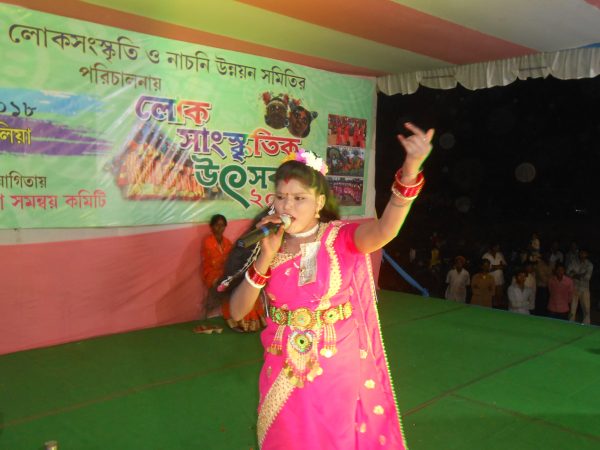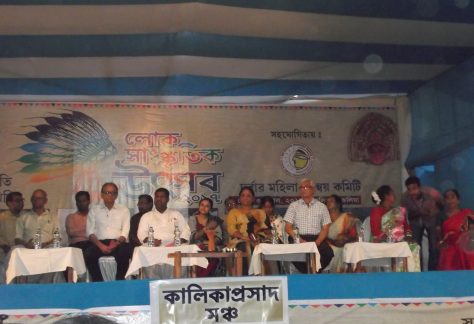OTHER ORGANISATIONAL ACTIVITIES
Durbar as part of its objective took all its efforts to reach out to people from different walks of life with an objective to engage them in sex workers’ issues. Expose the general community members before the reality of sex work and workers, Durbar developed a strategy to organize open ground festival.
Millennium Milan Mela was held in Calcutta from March 3rd to 6th, 2001, at the Salt Lake Stadium, Kolkata. Several well-known women’s rights activists had participated in this Mela. The Mela was organized in an open ground, around seven sub themes, and each sub theme was addressed through workshops, seminars, debates, exhibitions,cultural performances e.g. song and mimes, theatre, puppet shows and folk arts etc. through which issues related to women rights were highlighted. The Mela opened on the morning of March 3 spraying colours as the month is identified one of the popular festivals called Holi. This was followed by the release of pigeons, a colourful repertoire of songs and dances was performed in the dais by the Komal Gandhar, the cultural wing of DMSC. The day was declared as the International Sex Workers Rights Day.
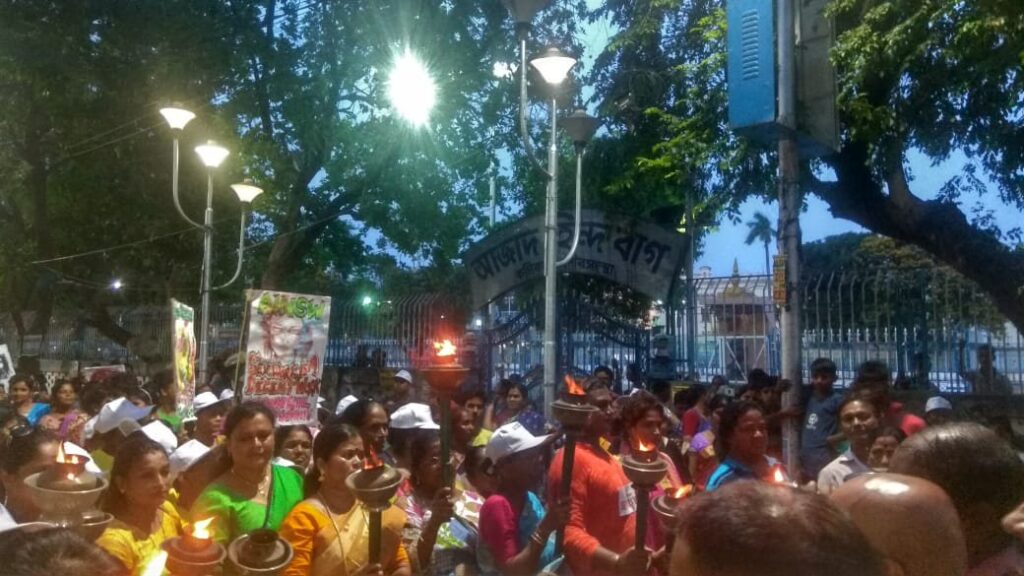
The Mela brought together women groups representing marginalized women which includes socially disadvantaged and stigmatized groups, indigenous and marginalized folk artists, lesbians, and transgender people. The Mela was also opened to general people who came and joined in many discussion sessions in addition to enjoying various cultural events. During these four days Mela, around 45,000 people representing different walks of life attended this Mela.
Shanti Utsav
Shanti Utsav (Peace Festival) was celebrated on the eve of International Sex Workers’ Day, between 3rd and 9th March 2002 at Yuba Bharati Krirangan, Salt Lake City, Kolkata with a view to convey the message of peace and harmony across the world. The mela provided the space for lively discussions on issues of individuals’ freedom of choice and liberty. Another focus of the Mela was to discuss the issues of rights and development of marginalized and minority communities.
Some of the key themes that were discussed at the mela ground were on the status and rights of sex workers, on the role of the state regarding the development of marginalized communities, issues of sexual minorities, and the role of women in the health sector development as well as on anti-trafficking initiatives. Around fifty thousand participants came down to this Mela ground and shared their views on issues of women and sex workers rights.
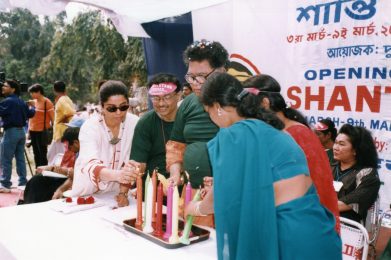
Sonagachir Ek Yug (12 years’ celebration of Durbar)
Sonagachir Ek Yug (12 years’ celebration of Durbar): DMSC organized the mega celebration for successful completion of 12 years of Sonagachi Project.The program started on 21st February 2014 and ended on 3rd March, 2004. Several cultural events were organized at the Mela ground. In addition to that, DMSC organized small scale events of similar nature in more than 20 sites in the state of West Bengal, to mark the success of 12 years of the Sonagachi project. During this programme in addition to commoner a good number of policy makers e.g. Member of Parliament, Mayor of Corporation, ministers representing different Government departments attended this program. A large number of intellectuals and academicians also took part in the said program. During this week-long program around 75 thousand people from the mainstream society attended this Mela.
The conference was attended by 61 International Participants from various countries e.g. Australia, Nepal, Bangladesh, Hong Kong, Cambodia, England and America. More than 1250 sex workers from different states of India also attended the program in addition to 3000 sex workers coming from different districts of West Bengal. In the program a large number of policy makers (90) did put their signature supporting all the priority demands. Also, during that time Durbar established partnership with four academic Institutions for research and capacity building initiatives for Sonagachi Training and Research Institute. The programme also focused on strengthening and collectivizing the unorganized labour sector while recognizing their need for collectivization, building and strengthening network among themselves.
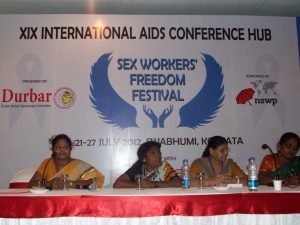
100 years of Women’s Day
Durbar Mahila Samanwaya Committee (DMSC) celebrated ‘100 years of Women’s Day, 1000 miles to go’ from 8th January to 8th March, 2011 in different districts of West Bengal. The inaugural ceremony of the programme was a seven days fair in an ‘open ground’, named Shradhananda Park, Kolkata. The main objective of the Mela was bringing forward issues of marginalized communities through respecting their emotional, aspirational issues and their ongoing struggle and victimization. We celebrated our success and simultaneously we were keen to focus on the emerging newer challenges. In addition to that we were interested on the issues of positioning of women in the broader development and political arena. The other focus was on different cultural activities which were undertaken on women’s issues and challenges in which renowned cultural troupes (Dance, Drama etc.) of West Bengal participated. A special effort was made to focus on the folk cultures of Bengal like Chhou, Natua, Bhawaiya, Nachni, Baul song, etc. More than 250 sex workers from different states of India attended the program and in addition to them 10000 sex workers came from different districts of West Bengal to attend the Mela alongside with the other marginalized women and local population. The organizations’ various wings set up different stalls at the Mela ground viz. USHA Cooperative Society, Amra Padatik, KomalGandhar, Srishti, Durbar Prakashani (Publication).
Sex Workers Freedom Festival, an Alternative International AIDS Conference Hub in Kolkata, India (2012)
The first-ever Global Hub of the International AIDS Conference, dubbed as the Sex Workers’ Freedom Festival (SWFF), began on 21st July with a pre-event gathering of sex workers dressed in vibrant and colourful attires. Sex workers representing 43 countries swamped Swabhumi from 22nd to 27th July 2012 for a unique event that was successfully hosted by Durbar MahilaSamanwaya Committee (DMSC) along with the Global Network of Sex Work Projects (NSWP) and the All India Network of Sex Workers (AINSW).
Sex workers from all over the world gathered in Kolkata to oppose the United States’ decision for not granting them travel visas based on the identity of sex workers. DMSC ran this parallel XIX International AIDS Conference Hub in Kolkata in partnership with other sex workers’ organizations.
Conference Chair Dr. Smarajit Jana said, “What was unimaginable a decade back is happening at the SWFF in Kolkata. The time has come to deliberate on issues of rights violations of sex workers perpetrated across the world. The Conference which has been, for the last 25 years a forum of a three-way dialogue between the scientists/planners, the people living with HIV and the most at risk communities. This is the first time the rights of vulnerable communities which includes sex workers has been thwarted by the U.S. Government which goes against the general ‘values’ and views of AIDS intervention program”. There was daily satellite communication between the two conferences, (the main conference held in Washington DC and the conference in Kolkata) which provided an opportunity for international delegates, the scientific community, sex workers, sex worker allies and many other stakeholders to join together with the participants of Kolkata, SWFF. It provided ample opportunities for participants to exchange ideas and experiences, SWFF acted as a platform to share views and aspiration of the community, and their voice to respect rights of those who are in Washington D.C. and to all other governments.
The representatives of sex workers from across the world articulated seven ‘freedoms’ for creating a global platform for sex workers to establish their rights so that they can meaningfully participate in their fight to end AIDS. The seven freedoms for sex workers as declared in the conference were:-
- Freedom of movement
- Access to quality in health services
- Freedom to work and choose occupation
- Rights to associate and unionize
- To be protected by the law
- Freedom from abuse and violence
- Freedom from stigma and discrimination
The SWFF provided for the first time to transgender sex workers a meaningful platform to speak and to join the wider campaign to safeguard rights of all sex workers – female, male and transgender. The SWFF also created an opportunity to celebrate the 20th year of DMSC’s Sonagachi Project, a community-led HIV Intervention program, which has been globally acclaimed as the best Model Project for AIDS prevention among sex workers.
Protibade Naari: Protirodhe Naari 2014 (Women in protest, women in resistance)
The six days long Sex Workers Festival “Protibade Naari, Protirodhe Naari” began on 29th January, 2014 with a star studded inauguration ceremony attended by eminent scholars, academicians, actors, human rights activists, in addition to MLAs & MPs of the country. Sex workers from 16 states of India under the parasol of All India Network of Sex Workers (AINSW) gathered in Triangular Park in South Kolkata, West Bengal from 29th January 2014. The program continued till 3rd February 2014 and during these six days Mela a series of discussion was held highlighting rights and social inclusion of sex workers and their access to social security. The framework what they proposed to restore rights and dignity pivoting around decriminalization of sex work. Sex workers from 16 states of India gathered in the program.
Number of themes based discussion was held in the Mela with special focus to
- Women’s’ Rights to information
- Women’s access to Health related rights and services
- Women and their rights to food
- Rights to education for girl child belonging to marginalized communities.
- Equal rights and social justice for women.
- Women and their rights to live in Stigma and Discrimination free environment
The 6 days long sex workers’ congregation was studded with various debating sessions and discussions focusing issues of social significance e.g. child marriage, Nuclear power, Depression, Homosexuality etc. There were couple of informative sessions, capacity building workshops etc. which addresses a wide range of issues ranging from Right to Information, Right to Food, Right to Social Security, Rights to access social entitlement of working women to Social inclusion and Access to Social and Political rights and dignity of Sex Workers. Like always, the special attraction of the Mela were the Documentary Films and the Cultural events. The theme of the films was based on diverse issues of Women rights and development. Each day ends up with colourful cultural events participated by renowned cultural troupes and organizations including Komal Gandhar.
First Lok Sanskriti Sammelan (Folk Art Conference) of Manbhum Lok Sanskriti and Nachni Unnayan Samity
To celebrate the successful completion of 10 years of the recognition of Nachni community as a folk artist, Manbhum Loksanskriti O Nachni Unnayan Samiti in collaboration with Durbar Mahila Samanwaya Committee organised three days (1st April-3rdApril 2017) long open ground fair ‘Lokosanskriti Mela 2017’ at Surulia, near Deer Park, Purulia. The fair got few essences of the almost extinct folk art of Purulia.
The year 2017 is a landmark in the history of Nachni community. They got their recognition as folk artists by the government of West Bengal in 2006 and completed 10 years of their journey. Durbar Mahila Samanwaya Committee as part of the mission stands in support of the marginalised communities and help them to fight for their rights and recognition.
Sabar Pita Gopi Ballav Singh Deo whose contribution cannot be over improvised in the development and improvement of the quality of life of tribal communities in the district of Purulia was felicitated in the program.
Though Purulia is the land of various folk arts, their cultural forms are slowly losing its patronage and gradually becoming endangered because artisans are getting improvised and unable to maintain their livelihood and no space to protect their arts. It is Durbar’s initiative to give them the opportunity to showcase their culture at their own soil. To achieve such level of success the fair got support from many stakeholders including government representatives, civil society leaders and donors.
The closing ceremony of the conference of folk culture was enriched by the presence of Honorable Minister of Paschimanchal Unnayan Parshad, West Bengal, Mr. Shantiram Mahato. In his speech he appreciated the initiative taken by Durbar for the reversal of the extinction of Nachni community. “This platform is helping folk artisans to revive the culture and heritage of Purulia. Apart from Nachni community Durbar is also working with other marginalized community for their existence and rights”, he commented. Each day ends up with colourful cultural events participated by renowned cultural troupes and local artisans of Purulia. The event ended with stunning performances of various folk dances like Chou, Jhumur, Natua, Tushu, Bhadu, Karam, Ghora Nach, Baul and Patanach, Hari Sankirtan which were highly acclaimed by the audiences present there. The event attracted more than 5000 people including local collectives, bank officials, academicians, scholars and NGO members. The year 2018 is a benchmark in the history of folk artisans as they completed a decade in getting recognition as folk artists from Government of West Bengal since 2006.
Loksanskriti Utsav
Since 2017, the Loksanskriti Utsav is being organized every year in Purulia, generally for three days in the winter months. About 200 cultural troupes presents their folk art during the Utsav. These programs are attended by about 5000 people from different strata of the society.
